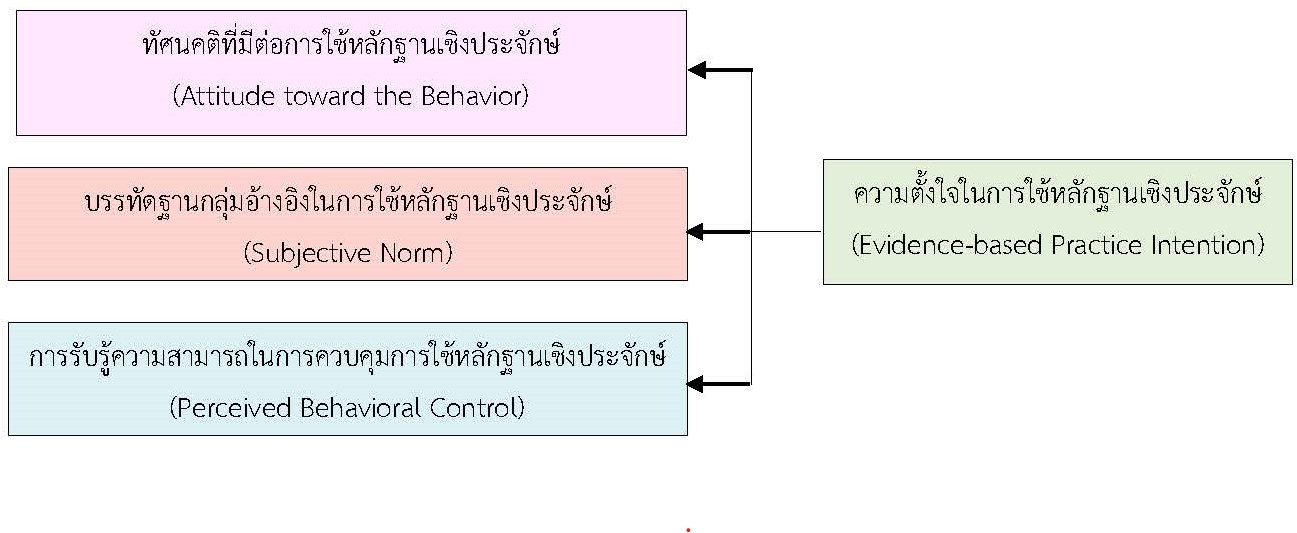Factors Related to the Intention to Implement Evidence-Based Practice by Nurses in University Hospitals
Keywords:
Factors, Intention, Evidence-Based Practice, in University Hospital NursesAbstract
This descriptive correlational study aimed to examine the intention and factors related to the implementation of evidence-based practice among 393 nurses working in university hospitals. The data collection tools included a questionnaire adapted from Kortteisto et al. (2010), covering the intention to use evidence-based practice, attitude toward evidence-based practice, subjective norms regarding evidence-based practice, and perceived behavioral control over evidence-based practice. The Content Validity Index (CVI) for all aspects was 1, indicating excellent content validity. Data analysis was conducted using descriptive statistic and Spearman correlation coefficients.
The research findings indicated that professional nurses working in university hospitals had a positive attitude toward evidence-based practice (Mean= 5.48, S.D. = 1.01). They exhibited a high level of subjective norms regarding evidence-based practice (Mean = 5.57, S.D. = 0.97). Their perceived ability to control and their intention to use evidence-based practice were at a moderate level (Mean = 4.06, S.D. = 0.45, Mean = 4.68, S.D. = 1.18, respectively). Attitude toward evidence-based practice, subjective norms regarding evidence-based practice, and perceived behavioral control over evidence-based practice were significantly positively correlated with the intention to use evidence-based practice among nurses (p-value < 0.01). This study provides guidelines for nursing administrators to support nurses in developing intentions, fostering attitudes, and promoting the ability of nursing staff to apply evidence-based practice continuously.
References
กิตติยารัตน์ ต้นสุวรรณ์, นันทวัน สุวรรณรูป และนันทิยา วัฒายุ. (2562). การรับรู้อุปสรรคการใช้หลักฐานเชิงประจักษ์ ทัศนคติ และประสบการณ์ การวิจัยต่อการปฏิบัติการพยาบาลโดยใช้หลักฐานเชิงประจักษ์ ของพยาบาลวิชาชีพ ในโรงพยาบาลส่งเสริมสุขภาพตำบล. วารสารวิทยาลัยพยาบาลบรมราชชนนี นครราชสีมา, 25(2), 25-40.
ธีรารักษ์ นำภานนท์, วิลาวัณย์ พิเชียรเสถียร และอุษณีย์ จินตะเวช. (2558). ปัจจัยที่สัมพันธ์กับการใช้หลักฐาน เชิงประจักษ์. พยาบาลสาร, 42, 49-60.
บุญใจ ศรีสถิตย์นรากูร. (2550). ระเบียบวิธีการวิจัย The methodology in nursing research. กรุงเทพฯ: ยูแอนไออินเตอร์มีเดีย.
ภาคย์ ชูชื่น. (2557). ระดับการยอมรับของลูกค้าต่อการประชาสัมพันธ์ของการประปาส่วนภูมิภาคสาขาเชียงใหม่. วิทยานิพนธ์รัฐประศาสนศาสตรมหาบัณฑิต มหาวิทยาลัยเชียงใหม่.
โรงพยาบาลมหาวิทยาลัยเขตภาคเหนือ. (2565). ข้อมูลวิสัยทัศน์ พันธกิจ โรงพยาบาลมหาวิทยาลัยเขตภาคเหนือ. สืบค้นเมื่อ 25 กันยายน 2566 จาก https://med.nu.ac.th/nuh/index.php/pages/vision
ศศิวิมล ศิริรักษ์, ทัศนี ประสบกิตติคุณ และอาภาวรรณ หนูคง. (2559). ปัจจัยทำนายการปฏิบัติการพยาบาลตามหลักฐานเชิงประจักษ์ของพยาบาลเด็ก. วารสารพยาบาลศาสตร์, 34(1), 5-15.
สำนักพัฒนาระบบบริการสุขภาพ กรมสนับสนุนบริการสุขภาพ กระทรวงสาธารณสุข. (2550). แนวทางการพัฒนาระบบบริการทุติยภูมิและตติยภูมิ. กรุงเทพฯ: ชุมชนสหกรณ์การเกษตรแห่งประเทศไทย.
อนุวัตร จุลินทร, ดุษฎี โยเหลา และเพ็ชรัตน์ ไสยสมบัติ. (2562). ทฤษฎีการกระทำด้วยเหตุผลและทฤษฎีพฤติกรรมตามแผน: การนำไปประยุกต์ใช้ด้านธุรกิจ. Humanities, Social Sciences, and Arts, 12(5), 128-145.
Ajzen, I. (1991). The theory of planned behavior. Organizational Behavior and Human Decision Processes, 50, 179-211.
Alatawi, M., et al. (2020). Barriers of implementing evidence-based practice in nursing profession: A literature review. American Journal of Nursing Science, 9(1), 35-42. https://doi.org/10.11648/j.ajns.20200901.16
Appleby, B., Roskell, C., & Daly, W. (2017). What are health professionals’ intentions toward using research and products of research in clinical practice? A systematic review and narrative synthesis. Collection of Nursing, 3, 1-12.
Atakro, C. A., et al. (2020). Knowledge, attitudes, practices and perceived barriers of evidence-based practice among registered nurses in a Ghanaian Teaching Hospital. International Journal of Africa Nursing Sciences, 12, 100204. https://doi.org/10.1016/j.ijans.2020.100204
Cote, F., Gagnon, J., Houme, P. K., Abdeljelil, A. B., & Gagnon, M. P. (2012). Using the Theory of Planned Behaviour to predict nurses’ intention to integrate research evidence into clinical decision-making. Journal of Advance Nursing, 68(10), 2289-2298. https://doi.org/10.1111/j.1365-2648.20110.05922.x
Dessie, G., Jara, D., Alem, G., Mulugeta, H., Zewdu, T., & Wagn, F. (2017). Evidence-based practice and associated factors among health care providers working in public hospitals in northwest ethiopia during 2017. Current Therapeutic Research, 93, 100613. https://doi.org/10.1016/j.curtheres.2020.100613
Forsman, H., Wallin, L., Gustavsson, P., & Rudman, A. (2012). Nursing students’ intentions to use research as a predictor of use one year post graduation: A prospective study. International Journal of Nursing Studies, 49, 1155-1164. https://doi.org/10.1016/j.ijnurstu.2012.04.002
Godin, G., Naccache, H., Morel, S., & E´ bacher, M. F. (2000). Determinants of nurses’ adherence to Universal precautions for venipunctures. American Journal of Infection Control, 28(5), 359-364. https://doi.org/10.1067/mic.2000.107594
Guo, R., Berkshire, S. D., Fulton, L. V., & Hermanson, P. M. (2017). Predicting intention to use evidence-based management among U.S. healthcare administrators: Application of the theory of planned behavior and structural equation modeling. International Journal of Health Care Management, 12, 25-32. https://doi.org/10.1080/20479700.2017.1336856
Haluza, D., Jungwirth, D., & Gahbauer, S. (2021). Evidence-based practices and use among employees and students at an Austrian Medical University. Journal of Clinical Medicine, 10(19), Article 4438. https://doi.org/10.3390/jcm10194438
Hashish, E. A. A., & Alsayed, S. (2020). Evidence-based practice and its relationship to quality improvement: A cross-sectional study among egyptian nurses. The Open Nursing Journal, 14, 254-262. https://doi.org/10.2174/1874434602014010254
Jylha, V., Oikarainen, A., Perala, M. L., & Holopainen, A. (2017). Facilitating evidence-based practice in nursing and midwifery in the WHO European Region. Retrieved September 2023 from https://www.euro.who.int/data/assets/pdf_file/0017/348020/WH06_EBP_report_ complete.pdf
Kortteisto, T., Kaila, M., Komulainen, J., Mäntyranta. T., & Rissanen, P. (2010). Health care professionals' intentions to use clinical guidelines: A survey using the theory of planned behaviour. Implementation Science, 5, 51. https://doi.org/10.1186/1748-5908-5-51
Labraguea, L. J., et al. (2020). Capability beliefs and the intention to adopt evidence based practices in the future among nursing students: An international study. Journal of Professional Nursing, 36(5), 301-307.
Li, S., & Zhu, X. (2019). Evidence-based practice: Knowledge, attitudes, implementation, facilitators, and barriers among community nurses-systematic review. Medicine, 98(39), e17209. https://doi.org/10.1097/MD.0000000000017209
Naz, H., & Ganaie, N., A. (2024). Evidence-based practice in nursing: A comprehensive Review. Clinical Medicine and Health Research Journal, 3(6), 713-715. https://doi.org/10.18535/cmhrj.v3i6.254
Ramis, M. A., Chang, A., & Lisa Nissen, L. (2019) Factors influencing undergraduate students’ intention to use evidence-based practice after graduation: Development and validation of a theory-based prediction model. Worldviews on Evidence-Based Nursing, 16(5), 397-407.
Shrestha, S., Deoisres, W., & Khumyu, A. (2018). Knowledge attitude perceived barriers and evidence-based nursing practice among nurses at tertiary level hospital in Dharan, Nepal. Thai Pharmaceutical and Health Science Journal, 13(1), 39-45.
Steglitz, J., Warnick, J. L., Hoffman, S. A., Johnston, W., & Spring, B. (2015). Evidence-based practice. International Encyclopedia of the Social and Behavioral Sciences, 8, 331-338.
Yoo, J. Y., Kim, J. H., Kim, J. S., Kim, H. L., & Ki, J. S. (2019). Clinical nurses’ beliefs, knowledge, organizational readiness and level of implementation of evidence-based practice: The first step to creating an evidence-based practice culture. PLOS ONE, 14(12), e0226742. https://doi.org/10.1371/journal.pone.0226742
Zegers, M., Hesselink, G., Geense, W., Vincent, C., & Wollersheim, H. (2016). Evidence-based interventions to reduce adverse events in hospitals: A systematic review of systematic reviews. British Medical Journal, 6, e012555. https://doi.org/10.1136/bmjopen-2016-012555

Downloads
Published
How to Cite
Issue
Section
License
Copyright (c) 2023 Journal of Nursing and Public Health Research

This work is licensed under a Creative Commons Attribution-NonCommercial-NoDerivatives 4.0 International License.
1. บทความหรือข้อคิดเห็นใด ๆ ที่ปรากฏในวารสารวิจัยการพยาบาลและการสาธารณสุข ที่เป็นวรรณกรรมของผู้เขียน บรรณาธิการไม่จำเป็นต้องเห็นด้วย
2. บทความที่ได้รับการตีพิมพ์ถือเป็นลิขสิทธิ์ของ วารสารวิจัยการพยาบาลและการสาธารณสุข








